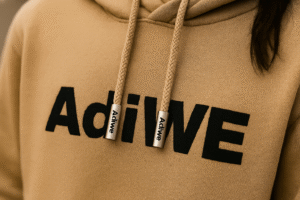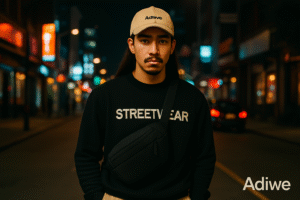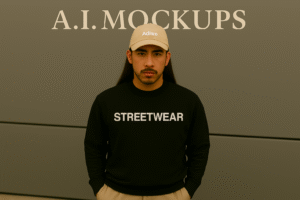Generic fabrics harm our planet and brand image. Consumers demand sustainable choices. Eco-fabrics offer quality, style, and a positive impact for your conscious streetwear.
Top eco-friendly fabrics like organic cotton, recycled polyester, hemp, and TENCEL™ Lyocell offer sustainable alternatives for custom streetwear. They provide quality, durability, and reduce environmental impact, aligning brands with conscious consumer values.
My clients, like "Fifty Fifty" from England, increasingly ask about sustainable options for their trendy hoodies and t-shirts. They understand that product features like top quality and personalized design can be enhanced by responsible material choices. As Sunny from Adiwe, a B2B wholesale factory in China with 5 production lines, I've seen this demand grow significantly. We specialize in customizable fabrics and craftsmanship, so exploring these options is natural for us. Let's explore the best eco-friendly fabric options available for your next collection.
Why is Organic Cotton a Go-To Eco-Staple for Streetwear?
Conventional cotton pollutes heavily. Your customers are concerned. Organic cotton offers a cleaner, softer alternative without compromising the classic streetwear feel.
Organic cotton is grown without harmful pesticides or synthetic fertilizers. This makes it better for the soil, water, and farmers. It provides a soft, durable, and eco-conscious base for t-shirts and hoodies.
!
Dive deeper Paragraph:
Organic cotton is a fantastic starting point for any eco-conscious streetwear brand. The benefits are significant. Growing cotton organically helps maintain soil health, reduces water pollution, and protects farmers from exposure to toxic chemicals. It also means no genetically modified organisms (GMOs). For your customers, organic cotton often translates to a softer feel and is hypoallergenic, making it great for everyday streetwear like t-shirts and hoodies. At Adiwe, we can source high-quality organic cotton that perfectly aligns with our commitment to "top quality." This material lends itself beautifully to personalized design, whether it's through eco-friendly prints or intricate embroidery. For clients like "Fifty Fifty," who value quality control and certifications, looking for Global Organic Textile Standard (GOTS) certified organic cotton is a strong move. This ensures traceability and adherence to strict environmental and social criteria, something we can facilitate in our B2B wholesale production.
Organic Cotton vs. Conventional Cotton
| Feature | Organic Cotton | Conventional Cotton |
|---|---|---|
| Pesticides | No synthetic pesticides used | Heavy use of synthetic pesticides |
| Fertilizers | Natural (compost, manure) | Synthetic chemical fertilizers |
| Water Usage | Often less due to healthy soil | Can be higher, more runoff pollution |
| Seed Type | Non-GMO | Often GMO |
| Soil Health | Improved | Degraded over time |
How Does Recycled Cotton Turn Waste into Fashionable Streetwear?
Textile waste fills landfills. This is a huge problem. Recycled cotton gives new life to old fabrics, reducing waste and your brand’s environmental footprint.
Recycled cotton uses pre-consumer (scraps) or post-consumer (old garments) waste. This diverts textiles from landfills, saving water and energy compared to virgin cotton production. It’s great for unique, textured streetwear.
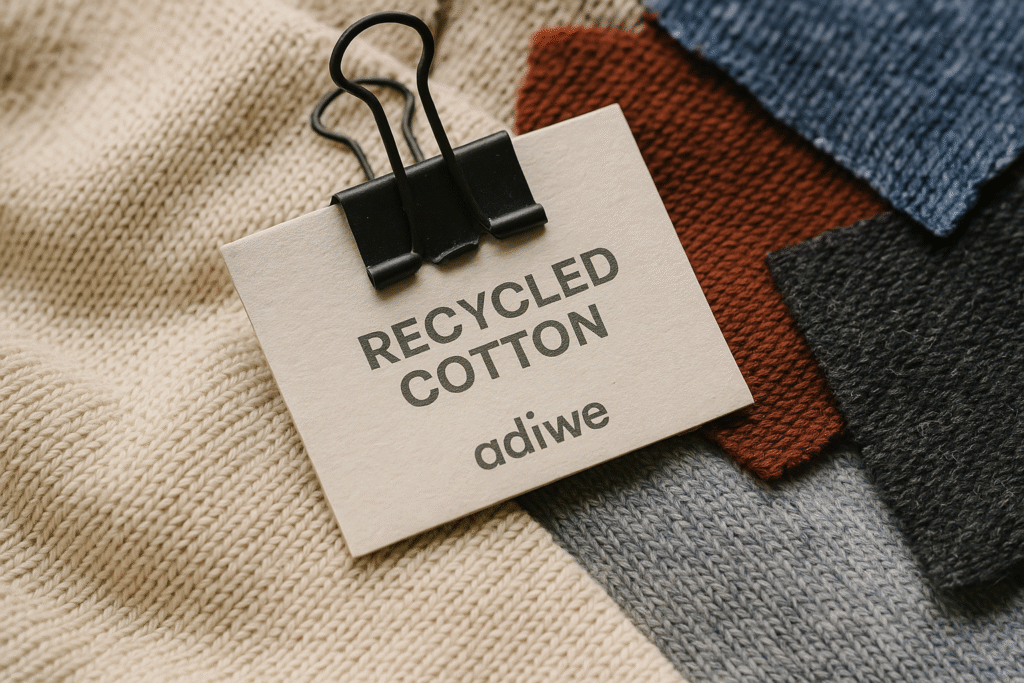
Dive deeper Paragraph:
Recycled cotton is a brilliant example of circularity in fashion. It takes textile scraps from factory floors (pre-consumer) or old clothes (post-consumer) and breaks them down to be spun into new yarn. This process significantly reduces water and energy consumption compared to producing virgin cotton. It also means less textile waste ending up in landfills, which is a huge environmental win. The fibers in recycled cotton can sometimes be shorter, so it's often blended with other fibers like organic cotton or recycled polyester to enhance strength and durability for items like hoodies or more structured t-shirts. At Adiwe, we can manage these blends to ensure the final product meets your quality expectations. Aesthetically, recycled cotton can offer a unique, slightly heathered or textured look, which can be a cool feature for personalized design. This "imperfect" character can be very trendy and appealing to consumers who value authenticity and sustainability. For "Fifty Fifty," this could be an interesting option for a capsule collection with a distinct story.
Can Recycled Polyester (rPET) Make Your Performance Streetwear Sustainable?
Virgin polyester relies on fossil fuels. This isn't sustainable. rPET offers a durable, versatile alternative by recycling plastic bottles, reducing landfill waste and emissions.
Recycled polyester (rPET) is made from melted down plastic bottles or other PET waste. It offers durability, wrinkle resistance, and moisture-wicking properties similar to virgin polyester but with a lower environmental footprint.
Dive deeper Paragraph:
Recycled polyester, commonly known as rPET, gives a second life to plastic, particularly PET bottles. These bottles are collected, cleaned, and melted down into pellets, which are then extruded into yarn. This process uses significantly less energy and water than producing virgin polyester, and it helps reduce plastic pollution. rPET retains many of the desirable qualities of virgin polyester: it's durable, wrinkle-resistant, quick-drying, and can be moisture-wicking, making it great for performance-oriented streetwear, outerwear, or even custom accessories like drawcords for hoodies. As a factory, Adiwe can incorporate rPET into various garments. It's important to be aware of the microplastic shedding issue with all polyesters. We advise brands to educate consumers on washing with care (e.g., using a Guppyfriend bag) and we can explore tighter weaves or finishes that may reduce shedding. For clients like "Fifty Fifty," whose clothing styles can be complex, rPET blends can offer durability and specific performance features.
Why is Hemp Considered a Super Fiber for Eco-Conscious Streetwear?
Many crops deplete soil and need lots of water. This is unsustainable. Hemp grows fast with little water, no pesticides, and even improves soil.
Hemp is a highly sustainable crop. It requires minimal water and no pesticides. The fiber is incredibly strong, durable, and gets softer with wear, making it excellent for long-lasting streetwear.
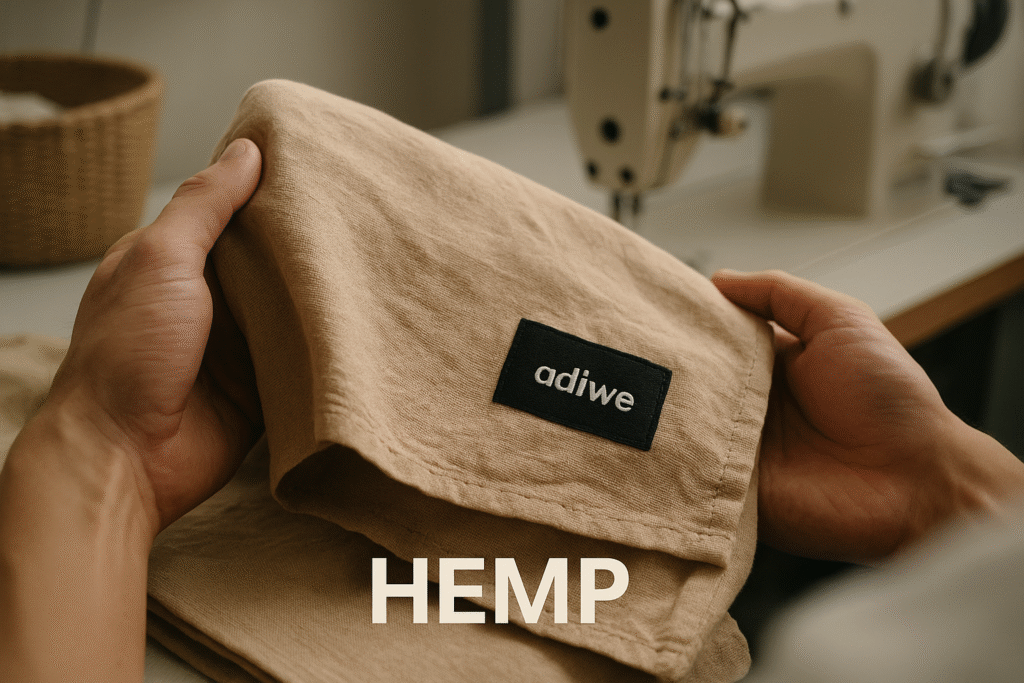
Dive deeper Paragraph:
Hemp is truly remarkable from an agricultural perspective. It grows quickly, requires very little water, and typically needs no pesticides or herbicides because it's naturally pest-resistant. It even helps improve soil health by replenishing vital nutrients. The fibers extracted from the hemp stalk are exceptionally strong and durable—three times stronger than cotton! This makes hemp ideal for streetwear pieces like sturdy t-shirts, hoodies, and even workwear-inspired items designed to last. Initially, hemp fabric can feel a bit coarse, but it softens beautifully with each wash and wear, developing a lovely character over time. At Adiwe, we can source hemp and hemp blends (e.g., with organic cotton for added softness from the start) that offer a unique, slightly rustic texture. This natural, earthy vibe is very trendy and aligns with a conscious consumer base.
Hemp vs. Cotton (General Comparison)
| Feature | Hemp | Conventional Cotton |
|---|---|---|
| Water Needs | Low | High |
| Pesticide Needs | Generally None | High |
| Durability | Very High | Moderate |
| Soil Impact | Improves soil health | Can deplete soil |
| Yield per Acre | High | Lower |
How Can Linen Bring a Naturally Cool and Sustainable Edge to Streetwear?
Hot weather streetwear can feel heavy. Synthetic options aren't always breathable. Linen, made from flax, offers natural coolness, strength, and a chic, eco-friendly vibe.
Linen comes from the flax plant, which needs little water or pesticides. It’s highly breathable, absorbent, and strong. It offers a distinct, slightly textured look perfect for summer streetwear.
Dive deeper Paragraph:
Linen is derived from the flax plant, another low-impact crop that requires minimal water and pesticides. It's one of the oldest known textiles for good reason. Linen is incredibly breathable and absorbent, making it exceptionally comfortable in warm weather – perfect for summer t-shirts, oversized shirts, or even lightweight hoodies. It's also very strong and gets softer and more lustrous with use. The characteristic slubby texture and tendency to wrinkle are often seen as part of its charm, giving garments a relaxed, effortlessly cool look that's very trendy for certain streetwear aesthetics. At Adiwe, we can work with linen and linen blends to create pieces that highlight its natural beauty. For personalized design, the texture itself becomes a feature. While it might be different from "Fifty Fifty's" typical complex hoodie, a linen-blend piece could be a great addition for a spring/summer collection, offering both style and comfort.
What Makes Lyocell (like TENCEL™) a Silky Smooth and Sustainable Choice?
Traditional viscose can be polluting. Customers want softer, eco-friendly options. Lyocell offers a luxurious feel using a closed-loop process, minimizing environmental harm.
Lyocell, often known by the brand name TENCEL™, is a rayon made from sustainably sourced wood pulp. Its closed-loop production process recycles water and solvents, making it very eco-friendly.
Dive deeper Paragraph:
Lyocell, particularly from reputable brands like TENCEL™, represents a significant step forward in cellulosic fiber production. It's made from wood pulp, typically from sustainably managed forests (often eucalyptus trees, which grow quickly and require little irrigation or pesticides). The magic of Lyocell lies in its closed-loop manufacturing process. This means that over 99% of the water and non-toxic solvents used to break down the wood pulp into fiber are captured and reused, dramatically reducing waste and environmental impact compared to traditional viscose. The resulting fabric is incredibly soft, has a beautiful drape, is breathable, and absorbs moisture well. This makes it ideal for premium t-shirts, flowy tops, or even linings for more structured streetwear. For my clients at Adiwe seeking that "top quality" feel and a touch of luxury in their personalized designs, Lyocell is an excellent, sustainable option. It offers a silk-like hand feel that "Fifty Fifty" might appreciate for elevating their hoodies.
Why is Modal (like TENCEL™) an Excellent Eco-Friendly Fabric for Softness and Color?
Some fabrics fade or lose softness quickly. This disappoints customers. Modal offers exceptional softness, vibrant color retention, and eco-credentials for lasting streetwear appeal.
Modal, especially TENCEL™ Modal, is made from beechwood using an eco-responsible process. It's known for its extreme softness, excellent drape, and ability to hold color well, even after many washes.
Dive deeper Paragraph:
Modal, particularly when produced under the TENCEL™ brand, is another fantastic eco-friendly cellulosic fiber, primarily derived from sustainably harvested beechwood trees. Like Lyocell, its production often involves eco-responsible processes that aim to recover co-products and minimize environmental impact. Modal is renowned for its exceptional softness – often described as being even softer than Lyocell – and its silky drape. It’s also very good at retaining vibrant colors, even after repeated washing, which is a huge plus for streetwear that needs to look good long-term. It's breathable and flexible, making it incredibly comfortable for garments worn close to the skin, like premium t-shirts or the inner lining of a cozy hoodie. At Adiwe, we can source high-quality Modal that allows our clients to offer that luxurious softness as a key feature of their "personalized design." For a client like "Fifty Fifty," who values quality and design, using Modal could enhance the comfort and perceived value of their complex hoodies.
Is Bamboo Lyocell a Truly Sustainable Option for Your Streetwear Line?
Bamboo viscose is often greenwashed. Its processing can be harmful. Bamboo Lyocell, however, offers a genuinely eco-friendly way to use fast-growing bamboo.
Bamboo Lyocell uses the same closed-loop process as wood-based Lyocell. This makes it far more sustainable than bamboo viscose, retaining bamboo's natural benefits like softness and breathability.
Dive deeper Paragraph:
It's crucial to distinguish between bamboo viscose and bamboo Lyocell. While bamboo itself is a fast-growing, regenerative resource that needs little water and no pesticides, the conventional process to turn it into viscose fabric can be chemically intensive and polluting. Bamboo Lyocell, however, applies the same environmentally sound closed-loop production method used for TENCEL™ Lyocell. This process uses a non-toxic solvent that is almost entirely recovered and reused, making it a much more sustainable way to harness bamboo's benefits. The resulting fabric is soft, breathable, moisture-wicking, and hypoallergenic, similar to other Lyocell fabrics. As a factory focused on "top quality" and helping clients create "very trendy" streetwear, Adiwe is committed to offering genuinely sustainable options. If a client requests bamboo, we would guide them towards bamboo Lyocell to ensure their "personalized design" is also an environmentally responsible one. This is the kind of detail a discerning buyer like "Fifty Fifty" would appreciate.
How Can ECONYL® Recycled Nylon Add Sustainable Durability to Outerwear Streetwear?
Virgin nylon is oil-based and polluting. Waste like fishing nets clogs oceans. ECONYL® transforms this waste into durable, high-performance nylon for conscious brands.
ECONYL® is a regenerated nylon made from waste like fishing nets, fabric scraps, and industrial plastic. It offers the same quality as virgin nylon but with significant environmental benefits.
Dive deeper Paragraph:
ECONYL® is a fantastic innovation in tackling plastic waste, particularly problematic nylon waste like discarded fishing nets, old carpets, and industrial plastic scraps. This waste is collected, cleaned, and then regenerated back into nylon yarn that has the same quality and performance characteristics as virgin nylon. This process significantly reduces the environmental impact compared to producing new nylon from petroleum, including lower greenhouse gas emissions and less reliance on fossil fuels. ECONYL® nylon is strong, durable, elastic, and can be made water-resistant, making it perfect for streetwear outerwear like jackets, windbreakers, track pants, or even durable custom accessories like bags or straps. At Adiwe, we can incorporate ECONYL® into designs that require robustness and a technical edge. For "Fifty Fifty," who have complex designs and need quality craftsmanship, using ECONYL® for certain elements could add both a sustainable story and practical durability to their streetwear.
Why is Using Deadstock Fabric a Smart and Sustainable Move for Limited Edition Streetwear?
Tons of quality fabric go unused by big brands. This creates massive waste. Using deadstock rescues these materials, offering unique, limited-run potential for your brand.
Deadstock fabrics are leftover materials from other fashion houses or textile mills. Using them prevents these quality textiles from ending up in landfills, offering a sustainable and often unique option.
Dive deeper Paragraph:
Deadstock fabric refers to surplus or leftover textiles from larger production runs by other brands or mills. Instead of letting these perfectly good materials go to waste (often to landfill or incineration), smaller brands can purchase them. This is a highly sustainable practice because it diverts waste and utilizes resources that have already been produced, requiring no new raw material extraction or dyeing processes. The appeal of deadstock for streetwear is multi-fold: it's eco-friendly, often comes in unique patterns or qualities that might be too expensive to commission for a small run, and inherently leads to limited edition pieces because the quantity is finite. This exclusivity can be very trendy. At Adiwe, we can work with client-sourced deadstock or sometimes help identify suitable options. For brands like "Fifty Fifty," this could be a way to create truly unique, "personalized design" hoodies or t-shirts for special drops, adding to their brand's story of thoughtful sourcing and design. The challenge can be inconsistency in supply, but the creative potential is huge.
Conclusion
Adopting eco-fabrics is not just a trend; it's a responsible choice. These top 10 options empower your streetwear brand to be stylish, high-quality, and kind to our planet.

